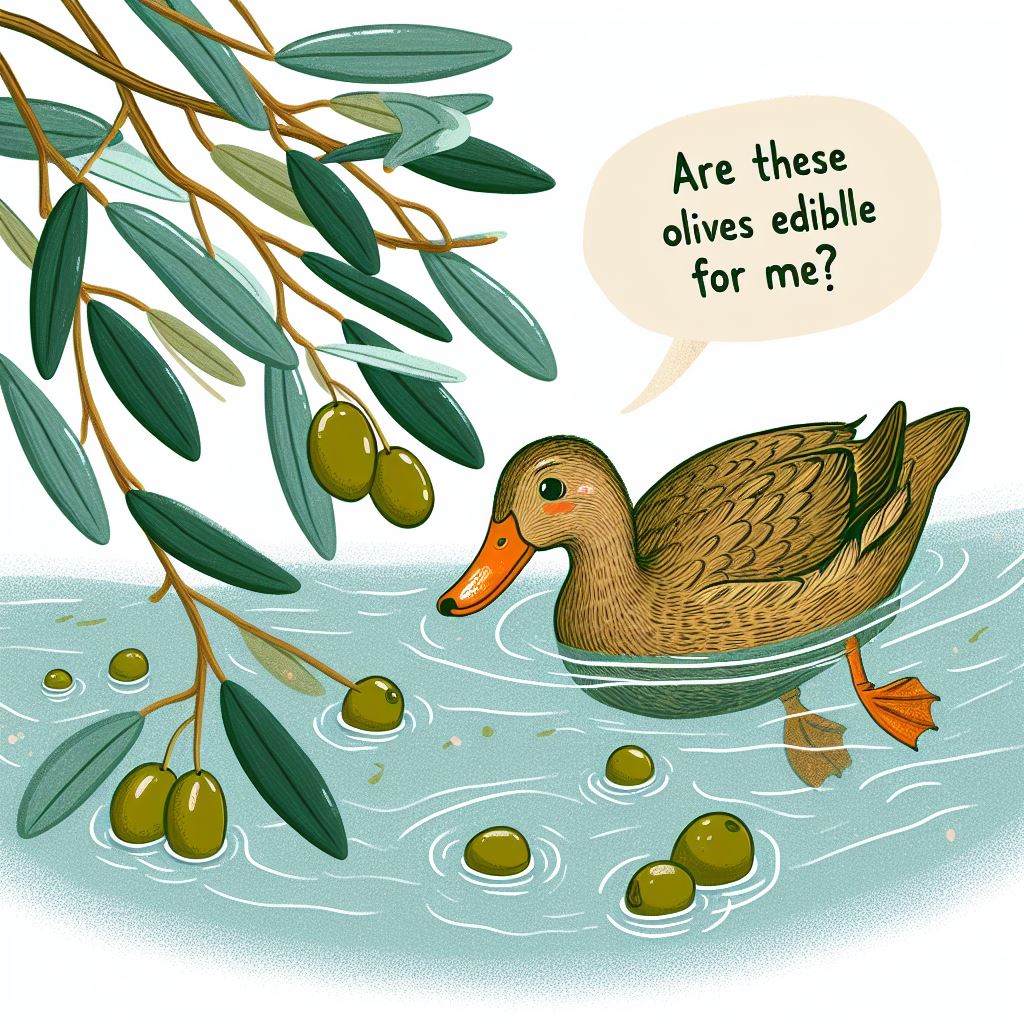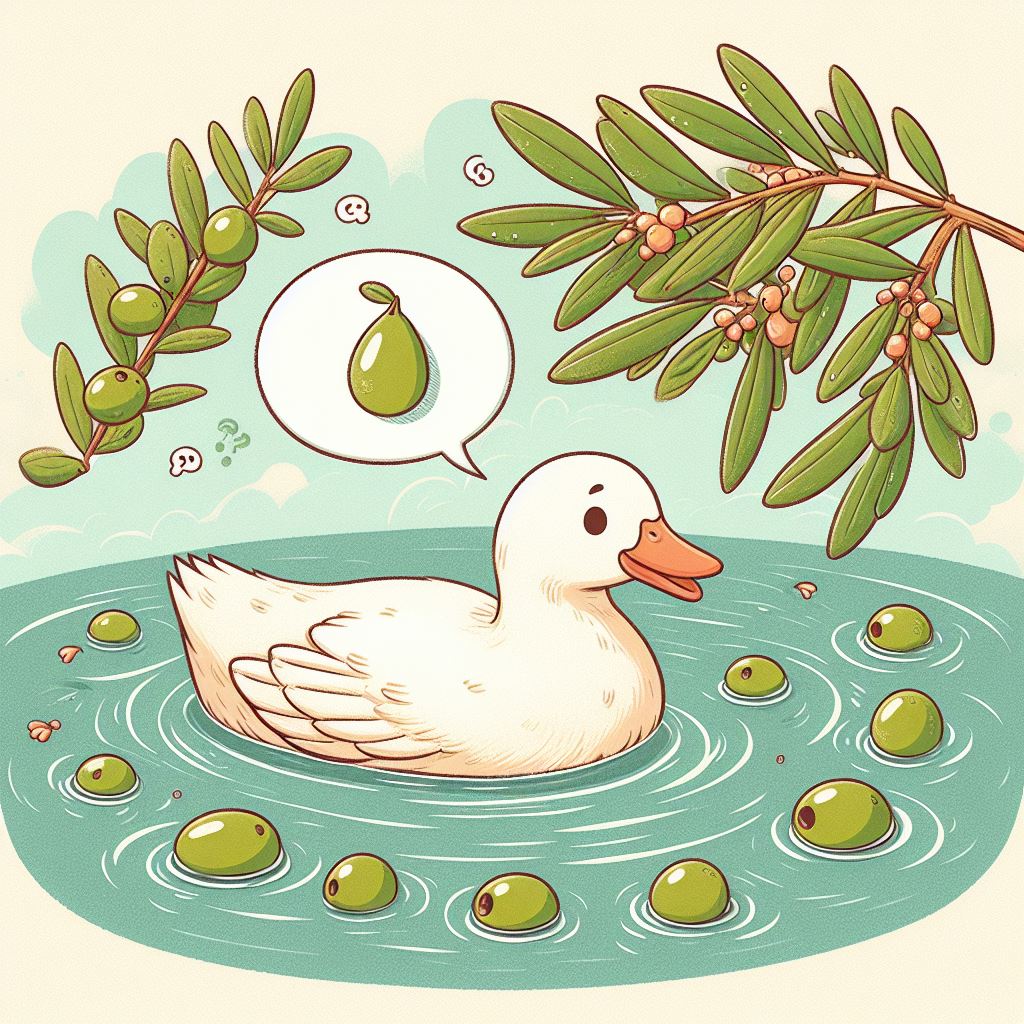Yes, ducks can eat olives.
I can confirm that olives are generally safe for ducks to consume in moderation.
Olives provide some nutritional benefits for ducks – they are high in healthy fats and contain antioxidants like vitamin E.
However, olives should only make up a small part of a duck’s diet.
Too many olives could lead to obesity or other health issues.
When feeding olives to ducks, it’s important to remove the pits first, as they could pose a choking hazard.
Chop the olives into bite-sized pieces to prevent this.
You’ll also want to introduce olives slowly at first to monitor for any digestive upset.
In my professional opinion, the occasional olive can be a tasty, nutritious treat for ducks.
But as with any treat, moderation is key.
I recommend limiting olives to no more than 10% of your duck’s total food intake.

- What types of olives are safest for ducks to eat - green, black, kalamata, etc?
- Should olive pits be removed before feeding olives to ducks? This is an important safety consideration regarding the risk of choking.
- How often can ducks eat olives - daily, weekly, monthly?
- Can too many olives upset a duck's digestive system?
- Do olives need to be chopped into small pieces before feeding to ducks?
- What are some signs that a duck has eaten too many olives? Recognizing potential toxicity signs assists with proper monitoring.
- Helping Resources:
What types of olives are safest for ducks to eat – green, black, kalamata, etc?
All varieties of olives can be fed to ducks in moderation, including green, black, and kalamata olives.
The most important thing is to properly prepare the olives before feeding them.When it comes to olives, the main safety concern is the bitter compound oleuropein.
To remove this, olives need to be cured, either with brine, salt, or lye.
Once cured, all varieties are safe for ducks.
I would avoid giving them unfinished raw olives, as the oleuropein can cause digestive upset.The other consideration is the salt content.
Many cured olives are packed in a salty brine.
Rinsing the olives before feeding will help reduce excess salt intake.In terms of nutrition, all olive varieties provide healthy fats and antioxidants.
Green olives may have slightly higher levels of bitter compounds before curing, but they are still perfectly safe once properly prepared.
Black olives and kalamata olives offer great flavor and nutrients too.I suggest mixing up the olive varieties to give your ducks some taste variety!
Just be sure to give olives in moderation, as too many can lead to obesity.
A few olives here and there make an excellent treat.
Monitor your ducks as you introduce new foods and watch for any signs of digestive upset.
Should olive pits be removed before feeding olives to ducks?This is an important safety consideration regarding the risk of choking.
I can tell you that signs of overindulgence in chickens, particularly from eating too many blackberries, may include diarrhea and lethargy.
These symptoms can indicate that the chicken has overeaten and is experiencing digestive issues or discomfort.
It’s important to monitor the chicken’s behavior and health closely if you suspect overindulgence to ensure they receive appropriate care and attention.
When it comes to identifying signs of overfeeding or overindulgence in chickens, it’s essential to pay attention to their physical and behavioral changes.
Diarrhea and lethargy are common indicators that the chicken may have consumed an excessive amount of a particular food, such as blackberries.
Additionally, changes in laying patterns, egg quality, leg and feet conditions, and temperament can also signal overeating and its potential impact on the chicken’s health.It’s important to note that while blackberries are a nutritious treat for chickens, moderation is key to preventing overindulgence and its associated health issues.
Monitoring the flock’s diet and observing any signs of overeating will help ensure the well-being of the chickens under your care.
How often can ducks eat olives – daily, weekly, monthly?
I would not recommend feeding olives to ducks on any regular basis.
Ducks have very different digestive systems compared to humans, being adapted to process grains, aquatic plants, insects, and small fish.
Their systems are not designed to properly break down and utilize foods like olives.
While an occasional olive as a treat would likely not cause harm, regularly feeding olives could lead to gastrointestinal upset or nutritional imbalances.
I would advise sticking to a balanced commercial duck feed as the staple diet, and limiting any people foods to very small amounts as occasional treats only.
Things like lettuce, bird seed, mealworms, or duck-friendly fresh produce can make better supplemental treats.
Ultimately moderation and variety are key when it comes to duck nutrition and preventing potential health issues.
Can too many olives upset a duck’s digestive system?
I can provide some insight into the effects of olives on a duck’s digestive health.In short – yes, feeding ducks too many olives could potentially cause gastrointestinal upset.
Ducks have a relatively simple digestive system compared to many mammals, so introducing large amounts of unfamiliar or difficult-to-digest foods into their diet suddenly can disrupt normal function.
When consumed in moderation, most ducks can tolerate olives without issue.
However, olives contain compounds like oleuropein and tannins that can irritate the digestive tract lining if large quantities are eaten.
Consuming many olives at once could lead to diarrhea, intestinal inflammation, or disruptions to gut microflora balance in ducks.
Additionally, the high fat and salt content found in most olives can also trigger stomach pains, vomiting, or diarrhea if ducks overindulge.
So while an occasional olive or two is normally fine, I would advise against allowing unlimited access for ducks.
Moderating olive intake and providing a balanced, duck-appropriate diet is best to maintain good digestive health.
Monitoring for symptoms like loose droppings, lack of appetite, or lethargy after olive consumption can also help duck owners determine if quantities should be adjusted.

Do olives need to be chopped into small pieces before feeding to ducks?
I can provide some insight into properly preparing olives for your feathered friends.
When feeding treats like olives to ducks, it is generally best practice to chop the olives into bite-sized pieces first.
Ducks have relatively small throats compared to the size of whole olives.
If you feed them whole, large olives, they may have difficulty swallowing them.
This could potentially lead to choking hazards.
By taking a few extra minutes to chop or slice the olives into smaller, duck-appropriate pieces ahead of time, you greatly reduce this risk.
I recommend cutting olives into quarters or eighths, depending on the size of your particular ducks.
Smaller duck breeds like Calls or East Indies will need the olives in tinier pieces than larger ducks like Pekins or Rouens.
Take the time to evaluate the size that seems reasonable for your ducks’ throats.Properly sized olive pieces will allow your ducks to happily gobble this savory, nutrient-dense treat without worry.
What are some signs that a duck has eaten too many olives?
Recognizing potential toxicity signs assists with proper monitoring.
I want to provide some helpful information about signs that your duck may have consumed an excessive amount of olives.
Monitoring for these signs can assist duck owners like yourself in ensuring your feathered friends remain happy and healthy.
In brief, key signs that indicate a duck has overindulged on olives include diarrhea or loose stools, lack of energy or appetite, and difficulty swallowing.
Let’s explore these issues further.
Firstly, one of the most common indicators is abnormal stools.
Olives have a high fat content which can lead to diarrhea or loose, oily appearing droppings if too many are eaten.
This can cause dehydration and discomfort for ducks if left unchecked.
You may also observe behavioral changes like low energy, lack of interest in favorite foods, or difficulty swallowing.
The phenols and acids in olives can be an irritant if consumed excessively over a short period.
This can make a duck feel unwell.
As your duck’s veterinarian, I want to emphasize that olives can be fed safely and make a fine occasional treat.
However, moderation is key, as too much of even a good thing can cause problems.
By monitoring your duck for signs like digestive upset or changes in behavior, you can adjust their olive intake as needed.
Helping Resources:
[1] https://adreenapets.com/can-ducks-eat-olives/
[2] https://farmyardcare.com/can-ducks-eat-olives/
[3] https://raisingducks.net/what-can-ducks-eat.html
[4]https://www.reddit.com/r/adhdmeme/comments/prh8xo/forgot_to_eat_try_this_one_weird_trick/
[5] https://canduckseat.com/fruits/olives/
